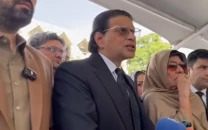New bill seeks to disqualify MPs with dual nationalities
Mover wants similar punitive action for parliamentarians and bureaucrats maintaining foreign bank accounts.

An opposition MP on Tuesday introduced a private constitutional amendment bill in the National Assembly, seeking the disqualification of parliamentarians and bureaucrats holding dual nationalities or holding assets or bank accounts outside Pakistan.
The legislation by Raza Hayat Hiraj of Pakistan Muslim League-Quaid (PML-Q) called for the insertion of another article (63B) in the country’s constitution, to be applicable to the members of the national parliament, provincial assemblies and civil and military officials.
Article 62 and 63 elaborate conditions under which a lawmaker can be removed.
Though the government did not block the introduction of the bill and let it go to the house committee for further consideration, its future remains uncertain because many of the country’s top politicians have businesses abroad.
President Asif Ali Zardari and former premier Nawaz Sharif reportedly either have assets or bank accounts in various countries.
In the past as well, Pakistan witnessed ‘imported’ individuals such as Moeen Qureshi and Shaukat Aziz leading the government and then leaving the country once their terms were over. Hiraj said that under the proposed amendment, no person with dual nationalities, foreign accounts and property abroad would be eligible for holding a public office or become a member of the parliament or provincial assemblies.
He said the disqualification would be applicable if an individual maintains an account in his own or his spouse’s name or holds a dual nationality or has a permanent resident status of any other country.
The legislation also sought disqualifications for those holding an office of profit or interest in any company established in a foreign country.
Having a business outside Pakistan would also disqualify an individual from holding a public office, according to the draft bill.
Religious Affairs Minister Khursheed Shah did not oppose the introduction of the bill though he said the legislation carried many technical flaws.
Shah assured the house that the service structure of engineers affiliated with the Pakistan Engineering Council (PEC) would be reviewed after taking up the matter with the PM.
Published in The Express Tribune, April 20th, 2011.



















COMMENTS
Comments are moderated and generally will be posted if they are on-topic and not abusive.
For more information, please see our Comments FAQ